Frederick William ‘Fred’ Taylor was born in Chelmsford and educated at a boarding school and at the town’s Grammar School. He became a very successful accountant, commission agent, estate agent and auctioneer with many other business interests. He married in 1893 and went on to have three children. Away from his business activities he was a part-time soldier, with the Volunteers and later the Territorials. At the start of the war he was put in command of the 2/5th Essex Regiment and led a countywide recruitment drive for soldiers, work that put an immense strain on his health. His poor health prevented him from serving overseas and he died in a London nursing home in July 1916. His home was in Moulsham Street. A nephew was killed during the war.
TAYLOR, FREDERICK WILLIAM*,
Lieutenant Colonel, 2/5th Battalion, Essex Regiment
(formerly of 21st Middlesex (Artists) Volunteers and 2nd Volunteer Battalion, Essex Regiment)
Text
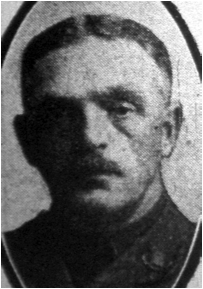
Fred was born in Chelmsford on 2nd June 1866, the son of the journalist John Taylor (1831-1892) and Matilda Taylor (nee Brown) (c1837-1899). The couple had married around 1858.
Fred's siblings, all Chelmsford-born, included John Joseph Edward Taylor (c1859-1908), Alice Matilda Taylor (1860-1936), Florence Mary Taylor (born in 1862), George Woodland Taylor (1863-1921), Edith Sarah Taylor (1867-1946), Ernest Harry Taylor (1868-1928), Rose Louise Taylor (1870-1942), Sidney Clifford Taylor (1872 -1947), Ethel Emma Taylor (born 1873), Howard Cecil Godfrey ‘Dick’ Taylor (c1878 -1913), and Hilda Annie P. Taylor (born in 1879).
In 1871 the census found four year-old Fred living with his parents, seven siblings, and two servants in High Street, Chelmsford where his father published the Essex Weekly News.
A decade later the census listed 14 year-old Fred boarding at a school in Braintree. He was also educated at the King Edward VI Grammar School in Chelmsford.
On 20th March 1885 Fred began his army career by enlisting as a Private into the 20th Middlesex (Artists’) Rifle Volunteer
Corps, based in Euston Road, London. The unit was part of the Volunteer force which were the precursor to the Territorial Army. He remained with the Middlesex (Artists’) Rifle Volunteer Corps until 25th March 1890, by which time he had served for five years and five days.
The following year, 1891, the year that his father was chosen as the Mayor of Chelmsford, the census recorded Fred staying with his future father in law, James Samuel Brown, proprietor of Brown & Son timber and coal merchant, at Bleak House in New London Road, Chelmsford. He was an accountant and commission agent.
Fred's father suffered from diabetes, a disease that led to his death in 1892. On 14th October 1892 the Essex County Chronicle reported:
“DEATH OF THE MAYOR CHELMSFORD.
The Mayor Chelmsford (Councillor John Taylor) passed peacefully away 4.45 o'clock on Friday morning.
Ald. Taylor had been ill nearly a month, suffering from angina pectoris and three weeks ago but little hope was entertained his recovery, He rallied, how-ever, and for several days continued to improve. Subsequently, various complications of, the disease manifested themselves, and Mr. Taylor was reduced to a state of extreme weakness.
About three o'clock on the Wednesday morning he was seized with acute attack of spasms the and, although he retained consciousness, he was in intense pain. His medical advisers, Messrs. Wheeler and Waller, were in constant attendance, and the members of the Mayor's family were summoned.
On Thursday in last week Mr. Taylor was in a very critical condition, but during the day he rallied slightly. This improvement, however, seems to have been the last effort of nature, as early on Friday morning his heart ceased suddenly, and he passed peacefully away. Mr. Taylor retained consciousness to the last. All the members of his family, together with Mr. Waller, were present when he died.
Mr. Taylor was born at bow, on Sept. 9th, 1831, and he was thus 61 years age. He was apprenticed to the printing trade, and after the completion of his indentures, he secured the position of manager in a Fleet Street office. He came to Chelmsford in 1858 - thirty-tour years ago - to fill the post of manager of the printing department of the Essex County Chronicle and the Essex Herald.
He remained in this position four years, and then, in conjunction with his brother-in-law, Mr. E. Robbins, he started other journals. He was well known in connection with the various newspaper press associations, and at the time his death was vice-president of the Newspaper Society, formerly known as the Provincial Newspaper Society. It was not until recent years that Mr. Taylor took a prominent part in the public life of the town.
While holding the mayoralty he has undoubtedly done his best, struggling under very difficult circumstances. Mr. Taylor was also guardian the poor for the parish, having served the office three or four years. He has taken an interest in many of the institutions of the town, and in its palmy days he was supporter of the Literary and Mechanics’ Institutes. The deceased was a Nonconformist, attending the Baddow-road Congregational Chapel. Mr. Taylor leaves a widow, six sons, and six daughters….
The funeral took place on Wednesday afternoon at the Borough Cemetery, Writtle-road. The shops in the town closed at two o'clock, and hundreds of people assembled to pay a last mark of respect to the memory of the deceased Mayor. The funeral cortege started from High-street at three o'clock, and proceeded slowly up the London-road to the Cemetery. All along the road blinds were drawn, and the pathways were lined with people.“”
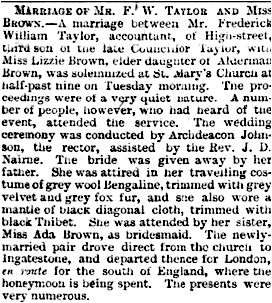
On 3rd January 1893 Fred married Lizzie Brown, the eldest daughter of James Samuel Brown (Mayor of Chelmsford in 1889-90) at St. Mary's Church in Chelmsford (today's Cathedral). At the time of the wedding he was aged 26 and employed as an auctioneer. His bride was aged 27.
The couple went on to have three children: Brian Fredrick James Taylor (1895-1962), Norah Winifred Taylor (1898-1986), and Christopher Taylor (1903-1903).
Fred was well known in Chelmsford as the founder and head of a very successful auctioneer and estate agent's business in the town with his partner Gilbert Wilks. The firm ‘Fred Taylor & Co.’ was well known in Chelmsford decades after Fred’s death.
Fred combined his full time business career with a return to part time soldiering. He gained a commission into the 2nd Volunteer Battalion of the Essex Regiment (forerunner to the Territorial 5th
Battalion of the Essex Regiment) on 1st September 1895. He was promoted Lieutenant on 13th January 1897.
In 1897 he was elected to command the representatives of his Battalion in connection with the Diamond Jubilee of Queen Victoria, and during the Boer War he organised three dinners - one for the Rifle Volunteers and Yeomanry, one for the Electrical Engineers, and one for the local members of the City Imperial Volunteers. upon their return to Chelmsford.
Fred was promoted to Captain on 4th November 1899, the year his mother died, aged 62. Her death was caused by diabetes, the same disease that had claimed Fred’s father’s life seven years previously.
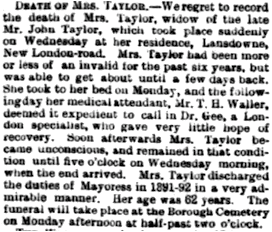
By 1901 Fred and his family had made their home in King Edward’s Avenue, Chelmsford, along with three servants, and he was working as an auctioneer and estate agent.
During his command of the Chelmsford Detachment (consisting of the A and B Companies) of the 2nd Volunteer Battalion, Essex Regiment (V.B.E.R. it was mainly through his efforts that the Drill Hall in Market Road, Chelmsford was built, he having raised within a few months subscriptions amounting to £4,500 for the building fund. Sir Evelyn Wood laid the foundation stone of the building and the opening ceremony was performed by Field-Marshall Earl Roberts on 4th July 1903.
On 7th January 1907 Fred was promoted to Major
in the 2nd Volunteer Battalion of the Essex Regiment. Fred was also a member of the Mess Committee and secretary of the Finance Committee of the Battalion. He was promoted to Major on 7th January 1907.
When the Territorial Army replaced the Volunteers in 1908 Fred retain his rank of Major and voluntarily travelled around the area of the new 5th Battalion of the Essex Regiment encouraging Volunteers to transfer.
After the formation of the Territorial Force Association he served as chairman of the Finance Committee and a member of Buildings, General Purposes, Ranges, and Sub-Accounts Committees. He organised a recruiting rally in the Chelmsford district to complete the establishment: 60 recruits were required, and he obtained 150, passed fit.
In 1911 the census recorded 44 year-old Fred living with his wife, daughter and four servants at Highfield, Moulsham Street, He remained an auctioneer and estate agent.
Fred's military enthusiasm also extended to the secretaryship of the County Rifle Association, a post he later resigned owing to poor health. In 1913 to mark their appreciation of his able services the members of the Association presented him with a handsome silver statuette of a rifleman, on a plinth, with drawers for cigars and cigarettes. It was at that presentation that the honour of his appointment as a Deputy-Lieutenant for Essex was announced, due in part at least to his valuable services to the Territorials.
In addition to his work as a Volunteer and Territorial, his extensive auctioneer and estate agent practice, Fred was secretary to the Essex Agricultural Society and to the Board of Agriculture Light Horse Breeding Committee, a member of the Chelmsford Board of Guardians, and Rural District Council, chairman of the Finance Committee and Cottage Homes Committee of the Chelmsford Board of Guardians, churchwarden of Widford, a synods man of St. Mary's, Chelmsford. a member of the St. Alban's Diocesan Conference, chairman of Messrs. Brown and Son Ltd, honorary secretary to the Chelmsford Football Club and the Chelmsford Bonfire Club. He was also auditor of the Chelmer and Blackwater Navigation Company, a director of the 'Essex Weekly News Series, Ltd.', a director of the Baddow Brewery Company, Ltd., a director and chairman of Messrs. Christy Brothers Ltd., and a director of the Chelmsford Gas Company.
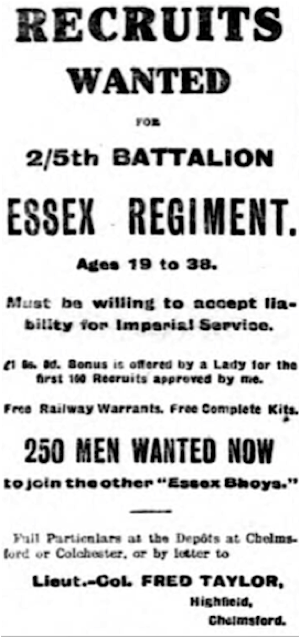
After the outbreak of the First World War Fred was ordered to take charge of the 5th Battalion Essex Regiment's Depot at the Drill Hall,was appointed to raise and command the 2/5th Battalion, Essex Regiment, and was promoted to Lieutenant-Colonel on 23rd September 1914.
He voluntarily undertook to arrange and speak at recruiting meetings in all parts of Essex, and travelled 5,000 miles and spoke during the evenings and on Sundays at over 100 meetings, and enlisted 4,500 recruits.
He also organised a 21-day recruiting march in May 1915 in Essex, spoke at over 100 meetings, and obtained 500 additional recruits at a time when it was proving difficult to attract them; the shortage of numbers preventing the release of the men overseas.
As part of that recruiting march Fred spoke at a public meeting in front of the Shire Hall, Chelmsford on 30th April 1915. The Essex County Chronicle reported his speech:
“Col. Taylor said he could not help noticing how few civilians there were in the crowd. He hoped the answer was that nearly all eligible men had gone, but feared it was because the men of Chelmsford, in common with some throughout the country, did not realise the position the country was in, and the tremendous task before them. Unless more men came forward —should he dare say if - (“yes”) - we should not come out top. Lieut. L. Gray, of his Battalion, had volunteered for foreign service, like 28 other officers had done. (Applause.) Why should he leave his comfortable home? Mr. Bawtree, who only came forward for home defence, realising the necessity, had also offered himself for imperial service. They only wanted the best men to come forward, men who were prepared to pot their heart and soul into the work for King and country. Until they found another 500 men
the Battalion was unable to go overseas, and that was a reflection on the Battalion. The War Office now said Essex was doing badly, because the Territorials were not completed, and he wanted some help to remove that reflection on the county. (Applause.)”
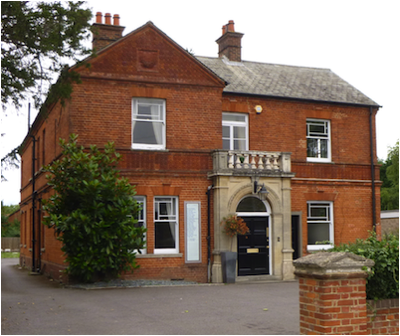
The following week he spoke at Colchester. The Essex County Chronicle reported:
“Col. Taylor, addressing the farmers, said some of them were not only not doing their own bit, but were keeping other men back. Thousands of young men from Canada, Australia, and New Zealand had come fight our battles: why the dickens should not some of the Englishmen at that meeting bear their part in the war?
They might say they had wives and had a business to look after. Well, he had got a business, and it was
gone. (Laughter) He had a wife, and, thank God, she was not gone. (Laughter.)
He had a family, and so did other officers in the 5th Essex, but they put their country first. In one. village he asked some farm labourers to enlist, and they replied— not without reason —"Why should I go while the governor's sons stop at home?”
If they wanted to know what soldiering was like, let them ask any of his men. and they would say that they felt better in health, better in temper, and better physically for having joined. The was now in such a critical position that every man between the ages of 19 and 38 ought to join the colours, and if a man looked a year or two older - well, he would not asked for his birth certificate. (Laughter.)
The farmers had told him to give a straight talk to the shopkeepers. Well, he would. Young men ought not to be content to stand behind counters and serve out butter, calico, cheese, so on. There were plenty of women in the country who could do that if these men would give up and come out and shoulder a rifle.
He would admit that the single men should go first; but because the single men were hanging back that was no reason why the married men should do the same. Why should he, his officers, and Lord Deerhurst give up their wives, homes, and families to go out and fight for those who were not prepared do their bit? It was not fair; It was a disgrace to those hanging back.”
The next week the Essex County Chronicle reported on another speech by Fred:
“Col. Fred. Taylor said had had some anonymous letters regarding his opening speech of that recruiting campaign to say that he was most unfair in what said. His answer was that 68 young men in Chelmsford did not think it unfair, and had come forward and enlisted. (Applause.) He spoke straight to tho shopkeepers, and said it was time the young men came from behind the counters. Since then six had left the Co-operative Stores to enlist, and others had left other shops. There were a lot of young men in shops in High Street who ought to come out too.
Since his campaign the total number enlisting through the depot at Chelmsford or through meetings had been 392. (Applause.) He hoped to make that number 400 before he started next day. He begged young men not to stay at home until they were fetched, for within a few months every single man would be roped m. (Applause). And these would have to go where they were wanted, not where they liked. (Applause.)
They would also have the satisfaction of hearing, "Well, he did not go till he was fetched." Where present volunteer received 1 shilling 2 pence a day, those compelled to come in would be lucky they got the 2 pence. He asked the married man to come forward as an example to the shirking single man. On Sunday ten men came forward from the small village of High Easter, but only one came from Good Easter. High Easter had since supplied eight more. (Applause.) They had heard of the heavy losses of the Essex Yeomanry; yet some of the single fellows said would not go until they were fetched. (" Shame.")”
Fred’s efforts were successful. He raised 1,250 men for his battalion, of whom 20 officers and 500 men were sent as drafts to the 1st and 3rd Lines.
However, after the strain of the work Fred’s health broke down. On 29th June 1915, while on duty with his Battalion at Peterborough, he fainted, He was found to have increased blood pressure with threatened cerebral haemorrhage and glycosuria. He was confined to bed for one month under medical care, and under treatment and dieting his blood pressure came down and his glycosuria improved. A Medical Board was held at Brighton on 19th August 1915 to examine Fred’s heath and it concluded that he was permanently unfit for general service (overseas), but could be fit for service at home in three weeks. The Board concluded that the illness had been caused by ‘the strain of raising and commanding a battalion.’ That conclusion meant that Fred would be unable to serve abroad.
Fred subsequently rejoined his battalion on 13th September 1915. At the request of senior commanders a further Medical Board was held at The Canons Hospital in Thetford, Norfolk on 14th October 1915. It concluded that Fred’s heart was enlarged slightly to the left and that the blood vessels were thickened. It also stated that ‘the original condition was due to hypertension and consequent cerebral irritation which would in all probability recur under circumstances of gard work and worry.’ Although his condition had greatly improved it was felt that he was still permanently unfit for general service though was now fit enough for service in the U.K. It also concluded that the condition had been caused by military service, namely ‘overwork recruiting.’
With his poor health preventing Fred from undertaking general service a new role would be required. In the light of his previous work on recruiting officers it was suggested that Fred join the army’s recruiting staff. He wrote several memos to his superiors detailing his military work and including supportive comments from some significant colleagues and friends. Typical is his letter dated 1st February 1916 which Fred sent to his commanding officer:
“In view of my medical unfitness for service overseas as certified by two medical boards, I beg to apply for another position in view of my being compelled at an early date to retire from my present command.
I am 49 years, 8 months of age, and have a record of 26 years service. I personally feel quite fit and am very active...In my county of Essex I have consistently worked hard for the Volunteer and Territorial movement and for my services I have neen publicly thanked amongst others by the Territorial Force Association, Lord Haldane (when Secretary of State for War), Field Marshall Sir Evelyn Wood, Lord Warwick (who appointed me as a Deputy Lieutenant for the County for my services as a Territorial Officer), Brig, Gen, F. F. Johnson C.B.
I may mention that whilst I was in command of the Recruiting Depot at Chelmsford, in addition to acting as commanding officer of the 2/5th Essex Battalion I spoke at over 200 meetings in various parts of Essex and enlisted some 5,000 recruits.
By business I am a land agent and valuer, I am willing to accept any position in the United Kingdom or abroad (if the medical authorities will allow me to do) where my business training or military service may be found of use to the country.”
While a decision was awaited on Fred’s next positing, on 14th March 1916, he was subject to a further Medical Board at Thetford which considered whether he was fit enough to continue serving in his current role. At the time he was suffering from hypertension and glycosuria. The Board concluded that there had been no change in his condition and that he was unfit for the strain of active service. It stated that the condition was permanent, had been caused by military service, had been contracted during that service under circumstances over which he had no control - specifically it had been caused by ‘overwork recruiting.’ However, the Board felt that he was fit for service in the United Kingdom.
He was transferred to the Territorial Force Reserve on 16th May 1916.
However, Fred’s health continued to be a cause for concern. Having suffered from occasional attacks of diabetes he started to suffer from frequent vomiting due to pyloric obstruction, becoming very ill. On 6th June 1916 his Harley Street doctor operated and found a large mass involving the gall bladder, duodenum and pylorus - the nature of which he could not determine, owing to adhesions.
A posterior gastroenterostomy was performed, but four days later Fred suddenly developed an acute obstruction due to an impacted gall-stone. A further operation was performed and the stone removed. A third operation was performed on 26th June 1916 to drain a large abscess in the pelvis. A few days later
During this period discussions continued to held to determine what role Fred should perform, and eventually in early July 1816 it was agreed that Fred could be employed on recruiting duties for the army’s Eastern Command, once he was sufficiently fit to do so.
However, by the time Fred received that news he was gravely ill. He died the following day, 10th July 1916, at 1:30 a.m., aged 50, he died in a nursing home, Henrietta House, 14 Henrietta Street, Cavendish Square, London; the cause of death being diabetes (like both his parents) and cholecystitis.
At the time of his death Fred's brother Alderman George Woodland Taylor J.P. was the then Mayor of Chelmsford (for the seventh occasion).
Fred's funeral took place in Chelmsford on 15th July 1916, with full military honours. The local press reported:
“FUNERAL OF COLONEL FRED. TAYLOR. IMPOSING SCENE & SERVICE,
The funeral of Lieut.-Colonel Fred. W. Taylor, D.L., T.D., of Chelmsford, whose death we recorded last week, took place at the Borough Cemetery on Saturday with full military honours.
Seldom, if ever, has there been a larger crowd of people lining the streets for such an occasion, and the congregation at the Cathedral, where the ante-grave service was held, was large and representative of the various organisations with which the deceased was connected.
The coffin, which was of fumed oak, was taken into the Cathedral at noon, and a short service, at which a few relatives only were present, was conducted the Rev. J. H. Barrow, the Cathedral Precentor, and the Rev. F. R. Thurlow, rector of Widford.
From then until the funeral service men the 5th Essex Regt., with which the deceased was so long and honourably associated, kept a solemn watch.
The service was an impressive nature, and was fully choral…
The Bishop, speaking from the chancel steps, said many words on an occasion like that were out of place, yet he could not allow it to pass without brief word. There were some things in this life they could place a value on, but he thought it was impossible to express the value of human life in pounds, shillings, and pence. It was not that way lives were estimated. They were thinking the life of one who had lived in the county, and was more particularly connected with the borough of Chelmsford - a great life, they might say, cut off, yet who knew. They did not measure life by length of years. Life was to be estimated by other methods than that. Col. Taylor was a man, essentially man. There was no padding, no trimmings about his life. He was just the type of man who had really made England what she was to-day. They knew how the war was sprung upon them. Col. Taylor did not need to be driven to take his place: at the call of duty was already there. From the first day war until his last active day of life his one thought was how best to fulfil his duty to his God, King, and Country. They owed him a great debt for what he did help to win the war. In season and out of season the towns and villages heard his call; men were roused from lethargy to keenness, and he (the Bishop) thought they had to owe some of those grand records men of Essex had already achieved to what he did and to what his voice produced. They thought of him one who did his, duty. He was not merely a man of war. In time peace he worked for his county, for the farmers as secretary the Essex Agricultural Show, and in the borough was connected with the Board of Guardians, and in other ways did his duty. In his home as well as in his public life he lived a clean, straight, honourable life...
Outside the church the coffin, which was covered by the Union Jack, and upon which the deceased's service cap and sword were laid, was met the band and pipers and a full Colonel's escort from the Royal Scots Fusiliers, in addition to representatives of the 5th Essex Regt. The slow procession to the burial ground, headed by mounted police, passed through crowded streets, in which the blinds were drawn.
The band was playing the Dead March in "Saul," and the pipers followed with solemn funeral music. Officers of the 5th Essex acted as pall-bearers, and other officers followed immediately behind the gun-carriage which bore the coffin, and which was drawn six black horses. Three A.S.C. wagons, full of floral tributes. were close behind. Then came the principal mourners, friends, representatives of various organisations, and the general public.
At the cemetery men of the 5th Essex carried the coffin the grave, which was bricked and lined with flowers, the remainder of the detachment each taking a wreath and falling behind the mourners. The service the graveside was conducted by the Rev. A. J. Sacre.
The firing party gave the usual three volleys over the grave with marked precision, the "Last Post" by the buglers concluding impressive ceremony. The military arrangements, which were remarkably well carried out. were in the hands Capt. Douglas Smith, assisted Capt. W. E.
The inscription on the coffin was Frederick William Taylor, Lt.-Col., D.L., T.D., died July 10th, 1916, aged 50."
Fred is not commemorated by the Civic Centre Memorial, Chelmsford, but is commemorated on the Widford War Memorial at St. Mary’s Church and the Chelmsford Parish War Memorial in Chelmsford Cathedral.
Fred left an estate of £21,789 1s. 6d.
Fred's nephew, George Francis Woodland Taylor, was killed in action near Fampoux on 4th May 1917, aged 20, while serving as Second Lieutenant in the 2nd Battalion of the Essex Regiment.
Fred's wife was buried with him when she died in 1951, and their daughter when she died in 1986.
140114